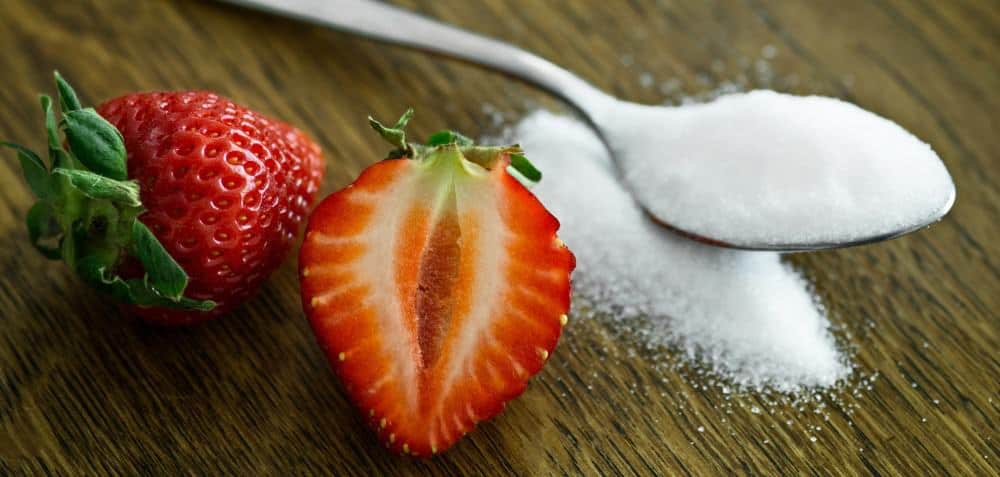Sweeteners enjoy a bad reputation. But are sweeteners actually bad for athletes?
Initially, artificial sweeteners were meant as a solution to the problem of increasing obesity.
Later, sweeteners were blamed for all kinds of health problems. From adiposity, diseases of the nervous system, indigestion to cancer, the list goes on.
Trust me, sweeteners have literally be blamed for everything. Sweeteners are practically equivalent to the devil.

What are Sweeteners?
Sweeteners are mostly calorie-free substances that cause a sweet sensation on the taste receptors of the tongue.
There are also sweeteners that have calories and can increase insulin production. But more on insulin and sweeteners later.
Most sweeteners have a multiple sweetness of sugar and even small amounts can have a very sweet taste.
An example of a calorie-free sweetener would be sucralose, which has a 600x higher sweetness than sucrose (= table sugar).
So, if you want to imitate the sweetness of 50g sucrose (for example, in a bar of chocolate) with sucralose, you only need 0.08g or 80mg.
Sucralose & insulin, cancer, intestinal microbiome, and obesity
Sucralose does not release insulin. Neither in healthy people nor in diabetics type 1 or type 2.
In addition, sucralose is not carcinogenic in vivo as well as in vitro. Even anti-carcinogenic effects of sucralose have been observed on certain cell lines of colon and kidney cancer cells.
However, only in doses that should not be taken orally, which in turn makes this effect irrelevant.
In long-term studies on mammals do not support any significant, if any, effects on the gut microbiome.
Sucralose doesn’t affect appetite and therefore may well be helpful in the prevention and treatment of diabetes mellitus and obesity.
Sucralose is safe!
So if you believed the horror stories, you were fooled!
You can safely use sucralose and other artificial sweeteners without fear of health damage or weight gain. this has been proven by several studies.

The safe Daily Dose of Sweeteners
So, according to studies, sucralose is safe and an option for those who want to lose weight or keep their weight.
Some people claim that you should be extremely careful because you can easily exceed the safe daily dosage. But is there any truth to this story?
Let’s see.
What is the ADI?
The ADI (Allowed Daily Intake) describes the amount of a substance, which one could take daily for his entire life, without having negative effects.
This includes an uncertainty factor, which additionally guarantees the safety of the intake.
The ADI is calculated from the value called NOAEL (No observed adverse effect level).
The NOAEL, on the other hand, comes from studies in which, with a certain amount, no negative effects occurred.
The NOAEL is usually divided by 100, so that the ADI usually corresponds to the hundredth or 1% of the NOAEL, in order to additionally be sure to go too far from the norm deviating people in it to capture so-called statistical outlier.
This means that the ADI value of a substance corresponds to the 100th of the dosage, which was judged to be safe in studies.
At this point, it should be clear that even if you go above the ADI, there won’t be any problems.
The ADI & sweetness of some of the most commonly used sweeteners
Aspartame
40 mg / kg body weight
about 200x sweeter than sucrose
= 37.6 Coke doses per day = 165 tablets / packet per day
Acesulfame
9 mg / kg body weight
about 200x sweeter than sucrose
= 36.7 coke doses per day = 165 tablets / sachet per day
Advantam
32.8 mg / kg body weight
about 200x sweeter than sucrose
= 888.9 Coke cans per day = 4’000 tablets / packet per day
Cyclamate
7 mg / kg BW
about 35-50x sweeter than sucrose
Saccharin
5 mg / kg BW
about 300-500x sweeter than sucrose
= 56.6 cola cans per day = 250 pills / packet per day
Sucralose
15 mg / kg body weight
about 600x sweeter than sucrose
= 36.7 coke doses per day = 165 tablets / sachet per day
Steviol glycoside
4 mg / kg body weight
about 200-300x sweeter than sucrose
= 6.4 cola doses per day = 29 tablets / packet per day
It’s true. Not all dosages are considered safe according to studies.
However, I have hopefully been able to show that it is almost impossible to exceed the dosages and certainly not on a daily.
Even if you are over the ADI for one day, this won’t be a problem. Because the amount according to ADI is only about one-hundredth of the dose at were no negative effects are observed.
Sweeteners are harmless and anything but harmful. Nevertheless, it has to be mentioned that sweeteners are not harmful, but can lead to an increased appetite.
These artificially sweetened drinks are no alternative to sweetened soft drinks.
Sweeteners for Athletes as an Alternative to Sugar
Sweeteners helped me personally to stick to my diet.
Since I have to eat fewer calories in the diet, I tend to use less calorie-dense foods, as I can eat more voluminous meals, which will make me more saturated.
Nevertheless, I often crave something sweet, but I did not want to “sacrifice my calories for a coke”.
But what does the evidence look like? Can sweeteners help reduce body weight?
In a large randomized clinical trial, caloric drinks were replaced with water or artificially sweetened drinks.
This led to a weight reduction of 2-2.5%, a clear message. Sweeteners can help with weight loss.
But 2-2.5% is not enough?
Clearly, 2-2.5% may seem like only a little. But let’s take a person weighing 80 kg as an example.
This would lead to a weight reduction of 1.6-2kg.
Because sweeteners, contrary to the opinion of some people, do not result in obesity. This has been shown in several studies.
Did you believe the story of the devilish sweeteners?
I’m sorry, but it’s Bs.
Conclusion: Are Sweeteners bad for Athletes
Well, it should be clear by now. Sweeteners are not bad for athletes.
But neither for anyone else. But since Athletes often go on strict weight loss diets, sweeteners can be especially helpful.
The athlete can still enjoy the sweet taste he is craving but doesn’t add any calories.
That’s the dream, isn’t it?
To end this article with my personal opinion. Use sweeteners wisely. Research shows that most sweeteners have little to no side effects.
But still, as Emerging Athletes, we want to eat as much unprocessed food as possible.
Use sweeteners if you have to, but not on a daily basis and never go higher than the ADI.
Cheers,
Sam
What’s your opinion on sweeteners?




